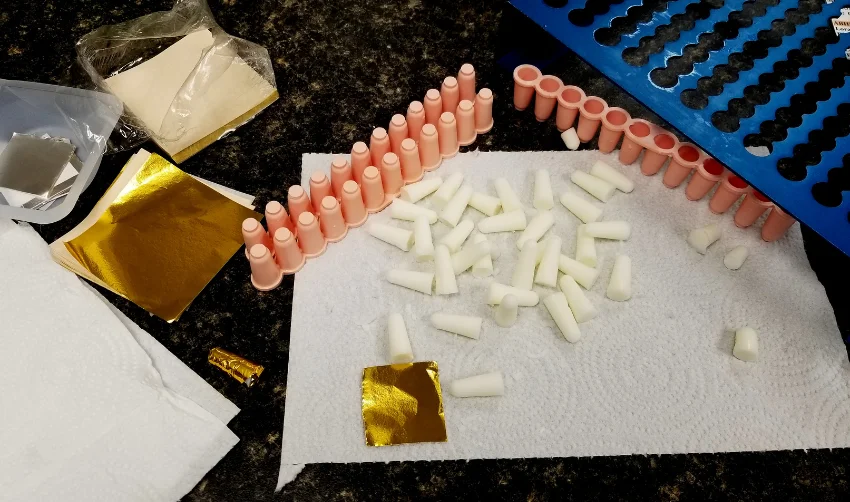Imagine experiencing long-lasting pain relief without relying on traditional oral medications. Compounding suppositories offer just that – a groundbreaking approach to pain management that is slowly revolutionizing the pharmaceutical industry. Unlike oral medications, suppositories are inserted rectally or vaginally, allowing the medication to be absorbed quickly and directly into the bloodstream. This delivery method bypasses the digestive system, resulting in faster and more effective results.
Compounding suppositories take pain relief to a whole new level. These are specially formulated medications that are customized to each patient’s specific needs. By combining multiple active ingredients into one suppository, compounding pharmacists can create a unique treatment tailored to address the individual’s pain and provide targeted relief. From chronic back pain to migraines, compounding suppositories have shown tremendous potential in managing various types of pain. They offer an alternative for patients who struggle with oral medications, have difficulty swallowing, or experience gastrointestinal issues.
The future of healthcare with personalized medicines is brightly illuminated by the advent of compounding suppositories, showcasing a shift towards more individualized pain management solutions. As the future of pain relief, compounding suppositories offer a promising solution that is both efficient and convenient. By delivering medication directly to the source of pain, they provide a powerful tool for individuals seeking effective and personalized pain management.
The Advantages of Compounding Suppositories for Pain Relief

Compounding suppositories offer several advantages over traditional pain relief methods. One of the key benefits is the ability to deliver medication directly to the source of pain. When oral medications are taken, they must pass through the digestive system before reaching the bloodstream. This process can lead to delays in pain relief and a decrease in efficacy.
With compounding suppositories, the medication is absorbed directly into the bloodstream, bypassing the digestive system and providing faster and more effective relief. Understanding where you need compound medications plays a crucial role in tailoring pain relief to each individual’s unique needs, especially when dealing with chronic conditions.
Another advantage of compounding suppositories is the ability to customize the medication to each patient’s specific needs. Compounding pharmacists can combine multiple active ingredients into one suppository, allowing for a tailored treatment approach. This personalized dosing ensures that patients receive the most effective combination of medications for their specific type of pain. Additionally, compounding suppositories can be adjusted to meet the individual’s dosage requirements, providing a more precise and targeted treatment option.
How Compounding Suppositories Work
Compounding suppositories work by delivering medication directly to the affected area, providing targeted relief. When inserted rectally or vaginally, the suppository dissolves and the medication is absorbed into the bloodstream. This method allows for a faster onset of action compared to oral medications, which need to be broken down and absorbed through the digestive system. The direct delivery of medication to the bloodstream also reduces the risk of gastrointestinal side effects that are often associated with oral pain medications.
Compounding suppositories are typically made by compounding pharmacists who specialize in creating customized medications. These pharmacists have the knowledge and expertise to combine multiple active ingredients into one suppository, ensuring that the medication is tailored to the individual’s specific needs. The suppositories can be formulated with a variety of pain-relieving medications, including nonsteroidal anti-inflammatory drugs (NSAIDs), muscle relaxants, and local anesthetics.
By combining these medications, compounding suppositories can provide a comprehensive approach to pain relief. The compounding formula used in these suppositories represents the pinnacle of pharmaceutical customization, blending multiple active ingredients for optimal efficacy.
Common Conditions that Can Be Treated with Compounding Suppositories

Compounding suppositories have shown tremendous potential in managing various types of pain. They offer an alternative for patients who struggle with oral medications, have difficulty swallowing, or experience gastrointestinal issues. Some of the common conditions that can be treated with compounding suppositories include:
1. Chronic back pain

Compounding suppositories can provide targeted relief for individuals suffering from chronic back pain. By combining muscle relaxants and anti-inflammatory medications, these suppositories can help reduce pain and inflammation in the affected area.
2. Migraines

For individuals who experience migraines, compounding suppositories can be a game-changer. These suppositories can be formulated with medications that specifically target the underlying causes of migraines, providing fast and effective relief.
3. Menstrual cramps

Compounding suppositories can offer relief for women who experience severe menstrual cramps. By combining pain-relieving medications with muscle relaxants, these suppositories can help alleviate the discomfort associated with menstrual cramps.
4. Post-operative pain

After surgery, many individuals experience pain and discomfort. Compounding suppositories can be customized to provide targeted pain relief, helping patients recover more comfortably.
The Benefits of Personalized Dosages in Compounding Suppositories
One of the key advantages of compounding suppositories is the ability to personalize the dosage to meet the individual’s specific needs. Unlike traditional pain medications, which often come in standard dosages, compounding suppositories can be adjusted to provide the most effective treatment. This personalized approach ensures that patients receive the optimal amount of medication for their specific type and severity of pain.
Personalized dosages in compounding suppositories offer several benefits. First, they allow for a more precise treatment approach. By tailoring the dosage to the individual’s needs, compounding suppositories can provide targeted relief and minimize the risk of side effects. This customization also allows for flexibility in dosage adjustments. As the patient’s pain changes, compounding pharmacists can modify the suppository to provide the appropriate dosage, ensuring ongoing pain management.
Comparing Compounding Suppositories to Other Forms of Pain Relief

Compounding suppositories offer several advantages over other forms of pain relief. Unlike oral medications, which need to be broken down and absorbed through the digestive system, suppositories provide a direct route for medication to enter the bloodstream. This results in faster and more effective pain relief. Additionally, suppositories bypass the digestive system, reducing the risk of gastrointestinal side effects commonly associated with oral pain medications.
Compared to topical creams or gels, compounding suppositories offer a more targeted approach to pain relief. When applied topically, medications can sometimes have limited penetration, especially if the affected area is deep within the body. Suppositories, on the other hand, deliver medication directly to the source of pain, ensuring maximum efficacy. Exploring the benefits of using a compounding pharmacy advantages patients by providing more precise, effective, and personalized medication solutions for pain relief.
How to Obtain Compounding Suppositories
To obtain compounding suppositories, individuals should consult with their healthcare provider. A compounding pharmacist can work closely with the healthcare provider to customize a suppository that meets the individual’s specific needs. The pharmacist will take into account the type and severity of pain, as well as any underlying conditions or medications the individual may be taking.
Once the suppository is formulated, it can be obtained from a compounding pharmacy. These pharmacies specialize in creating customized medications, including suppositories. The pharmacist will provide detailed instructions on how to use the suppository, including the frequency of administration and any necessary precautions. For residents seeking tailored pain relief solutions, a compounding pharmacy in Kensington, MD, offers state-of-the-art services in creating customized suppositories.
Potential Side Effects and Precautions of Using Compounding Suppositories

As with any medication, there are potential side effects and precautions to be aware of when using compounding suppositories. While these side effects are generally rare, individuals should be aware of them and consult with their healthcare provider if they experience any adverse reactions.
Some potential side effects of compounding suppositories may include irritation or discomfort at the site of insertion, allergic reactions to the medication, or changes in bowel habits. It is important to follow the instructions provided by the healthcare provider and compounding pharmacist to minimize the risk of side effects. Individuals should also inform their healthcare provider of any existing medical conditions or medications they are taking before using compounding suppositories. This information will help ensure that the suppository is safe and appropriate for the individual’s specific needs.
Conclusion: The Future of Pain Relief with Compounding Suppositories
Compounding suppositories represent the future of pharmacy, a field increasingly focused on personalization and direct effectiveness in pain management. By delivering medication directly to the source of pain, they provide a powerful tool for targeted relief. The ability to customize the suppository to each patient’s specific needs ensures optimal dosing and increased efficacy.
As the future of pain relief, compounding suppositories are revolutionizing the pharmaceutical industry. They offer an alternative for patients who struggle with oral medications, have difficulty swallowing, or experience gastrointestinal issues. With their ability to provide faster and more effective results, compounding suppositories are changing the way we approach pain management.
If you are looking for long-lasting pain relief without relying solely on traditional oral medications, consider exploring the benefits of compounding suppositories. Consult with your healthcare provider to determine if this innovative approach is right for you. Together with a compounding pharmacist, you can find a personalized treatment plan that offers targeted relief and improves your quality of life.


